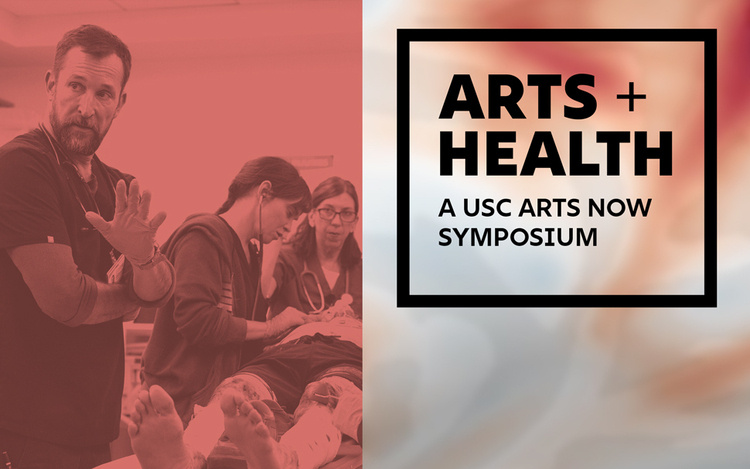
Live Artists Live [5.0]: Bodies Making Space
ADMISSION:
Admission is free. Reservations required.
RSVP
DESCRIPTION:
Since 2016, the USC Roski School of Art and Design has celebrated and spotlighted performance art through its biennial Live Artists Live festival. Now in its fifth iteration, the all-afternoon event will feature a diverse and dynamic group of artists exploring the intersections between dance, visual art spaces, and modes of performance, embodying and making space in relation to race/ethnicity, gender/sexuality, ancestry, and other forms of identity.
The Roski Graduate Building is located at 1262 Palmetto St. in the Arts District of Downtown Los Angeles.
Schedule (subject to change):
1–1:20 p.m.: CHECK-IN
Coffee and mixing
1:20–2 p.m.: WELCOME
Introductions by Amelia Jones and Alison D’Amato, and (un) land acknowledgement by Marcus Kuiland-Nazario, Louis Robles, and Laurie Steelink
2–3:15 p.m.: PANEL 1 - Space: taking/making territory or space
Featuring Jay Carlon, Sebastian Hernandez, and taisha paggett
3:15–3:30 p.m.: BREAK
3:30–4:45 p.m.: PANEL 2 - Body: psychic space, the phenomenology of performance and dance (mirror neurons; body remembering; habitus)
Featuring devynn emory, Brendan Fernandes, and Meena Murugesan
4:45–5:15 p.m.: DISCUSSION
Led by Amelia Jones and Alison D’Amato
5:15–5:30 p.m.: BREAK
5:30–7 p.m.: PERFORMANCE + CLOSING
Featuring Javier Stell-Fresquez and J. Andrea Porras / yAyA
Brendan Fernandes: “Dance is, for me, political. Dance is a means for protest.”
About the artists:
Jay Carlon (he/they) is a queer dance artist, choreographer, and community organizer whose work is grounded in a collective journey toward decolonization and sustainability. His work facilitates collective healing and the exploration of post-colonial identity, ancestry, and the complex experience of queer and Filipinx communities in relationship to site and space. Carlon is a 2023 recipient of the New England Foundation for the Arts National Dance Project Production Grant and the California Arts Council Established Artist Fellowship. In 2020, Carlon was named one of Dance Magazine’s “25 To Watch.”
Alison D’Amato is Associate Professor of Practice at the USC Kaufman School of Dance, as well as the school’s Assistant Dean of Academic and Faculty Affairs. She holds a PhD from UCLA, where she completed a dissertation on contemporary approaches to dance notation. Her writing on performance can be found in Dance Research Journal, Choreographic Practices, SFMOMA’s Open Space, Imagined Theatres, Contact Quarterly, and X-TRA Contemporary Art Quarterly, as well as the recent volume Object-Event-Performance: Art, Materiality, and Continuity Since the 1960s. Her dances have been presented widely in Los Angeles, New York, Philadelphia, and internationally.
devynn emory is a choreographer/dance artist (devynnemory/beastproductions), dual licensed bodyworker (sage), channeler, and registered nurse—practicing in the fields of acute/critical care, hospice, COVID, gender-affirming surgery, and integrative health. they are a psychiatric mental health nurse practitioner candidate, December 2025. emory’s performance company devynnemory/beastproductions finds the intersection of these fields, walking the edges of thresholds—drawing from their multiple in-between states of being, holding space for liminal bodies bridging multiple planes of transition, finding reciprocity as a constant decolonial practice. they are currently working on a trilogy centering medical mannequins holding the wisdom of end-of-life experiences: deadbird + can anybody help me hold this body, 2021, Cindy Sessions: LOVE, LOSS, LAND + Grandmother Cindy, 2022; and boiling rain, 2026. for this trilogy, emory is a grateful recipient of the Onassis Eureka award, 2022 Art Matters Artist2Artist award, 2023 FCA Merce Cunningham Award, and the 2023 USA Fellowship award. born on Lenape Land, emory is a descendent of mixed Lenape and settler ancestry.
Born in Nairobi, Kenya, Brendan Fernandes is an internationally recognized artist working at the intersection of dance and visual arts. Part ballet, part queer dance party, and part protest, Brendan’s projects address issues of race, queer culture, migration, protest, and other forms of collective movement to create new spaces and new forms of agency. Brendan is a graduate of the Whitney Independent Study Program and recipient of a Robert Rauschenberg Fellowship, the Canada Council New Chapters grant, the Artadia Award, a Louis Comfort Tiffany Foundation grant, and a Smithsonian Artist Research Fellowship. He is an assistant professor of art theory at Northwestern University and represented by Chicago’s Monique Meloche Gallery.
Sebastian Hernandez is a Los Angeles–based, gender-nonconforming dancer whose Hypathium was performed to a sold-out house at REDCAT in 2019. Per their artist statement: “My work is an interdisciplinary practice that incorporates movement, performance, sculpture, photography, video, and sound. I’m interested in performance that merges visual art and movement at an intersection that places aspects of my gender and queerness in a difficult conversation with histories of power and racialized capital. This manifests through the transformation of materials that are commonplace in working-class, Brown (Latinx, working-class Mexican, and indigenous) communities. These materials range from fruit to decorative party objects and utilitarian objects like grocery bags.”
Amelia Jones is Robert A. Day Professor of Art & Design at USC. Recent publications include Queer Communion: Ron Athey, co-edited with Andy Campbell (accompanying a retrospective of Athey’s work, which she curated); and In Between Subjects: A Critical Genealogy of Queer Performance. She is writing a book entitled Against Cultural Capitalism, which addresses the structural racism and neoliberalism of the art world and university, as well as organizing an exhibition of the work of Ken Gonzales-Day, to open at the USC Fisher Museum of Art in 2025.
Marcus Kuiland-Nazario is a native of Los Angeles and an initiated Lucumi practitioner. He is an interdisciplinary artist, performance curator, and producer. He is a founding artist of 18th Street Arts Center and Highways Performance Space and co-founder of the contemporary art center Oficina de Proyectos Culturales in Puerto Vallarta, Mexico, and LA Community Health Project, a street-based, harm-reduction needle exchange program. Kuiland-Nazario's long-term, research-based, cross-genre projects explore extreme states of emotion, such as grief, anger, and loss, which are influenced by the cultural and spiritual traditions of the African Diaspora coursing through his veins. His performance works have been in festivals, including the Rapture Festival at ICA London, the Rompeforma Festival in San Juan, Puerto Rico, Pacific Standard Time LA/LA in Los Angeles, The Queer Biennial in Los Angeles, CA, Live Artists Live: Simultaneity at USC Roski School of Art and Design, The Queer Commons: Politics of Friendship, Love and Affects in Skopje, Macedonia. Marcus has been awarded fellowships, including the City of Santa Monica Artist Fellowship and Artists At Work. He was the inaugural recipient of the 2024 Jackie Apple Award for Performance Art and Artists' Projects. He is the Creative Director of THE WRINKLE ROOM..
Meena Murugesan is a Bessie Award–winning video and dance artist who creates experimental, non-linear narratives at the intersection of live performance, video art, and social issues. Meena’s dance, video art, and collaborative video projection design work has been presented internationally, and she has collaborated with directors and choreographers such as jaamil olawale kosoko, taisha paggett, d. Sabela grimes, Marjani Forté-Saunders, Embodiment Project, Sita Frederick, Christopher Emile, Lionel Popkin, and D’Lo. Meena has fifteen years of experience working with racialized youth and criminalized communities as a collaborative act that hopes to unpack stereotypes, stigma, and systems of oppressions.
taisha paggett is an interdisciplinary dance artist whose individual and collaborative works re-articulate and collide specific western choreographic practices with the politics of daily life to contemplate and interrupt fixed histories of Black and queer embodiment, desire, placemaking, possibility, and survival. In 2014, paggett was featured in Velvetpark magazine’s “25 most significant queer women of the year” list, and, in 2017, was one of ten “womyn, and womyn-led community arts organizations” honored with an Avest Award for their “outstanding contribution to arts in Southern California.” paggett was a recipient of the Foundation for Contemporary Arts’ honorable Merce Cunningham Award in 2019.
J. Andrea Porras / yAyA is a Queer, 2Spirit, Coahuiltecan descendant Chicana, madre of JAH’Sol Amaru, cultura cura curator, producer, and intersectional artist and practitioner. They have been offering intersectional multimedia arte between edutainment and story sharing, storytelling ceremonias through solo and collaborations for over 25 years. Porras brings viewers into the past, present, and future via Charcoal Foot Travels, spoken palabra and improvs, teatro, y movimiento as relative and guest upon Sacred Indigenous Lands four decades and counting. Porras también curates visual exhibitions, creates site specific installations, ritual performance, teatro y flor, y canto movimiento.
Louis Robles is an enrolled member of the Juaneño Band of Mission Indians, Acjachemen Nation of San Juan Capistrano, recognized by the State of California as the Indigenous Peoples of Orange County. His ancestors were present at the founding of Mission San Juan Capistrano on November 1776, and he is a direct descendent of Jose Antonio Navarro and Roque Cota, two of the original Pobladores, families that were present at the founding of El Pueblo de Nuestra Señora la Reina de los Ángeles de Porciuncula, September 4, 1781. He is actively involved in tribal social and ceremonial events nationwide as a storyteller and singer, including in Alaska and Hawaii. He has participated in cultural exchanges with other tribal groups. For the past 22 years, Louie has served as chair of the Cal State Long Beach Native American Graves and Repatriation Committee, working to return ancestors' remains and burial goods that have been languishing in campus collections to their most likely descendants. He represented his tribe at the opening ceremonies of the Smithsonian Museum of the American Indian. In 2024, Louis was awarded the Presidential Lifetime Achievement Award for Community Service.
Multidisciplinary artist Laurie Steelink identifies as Akimel O’otham, and is a member of the Gila River Indian Community. Born in Phoenix, AZ, and raised in Tucson, she received a BFA from the San Francisco Art Institute, and an MFA from Mason Gross School of the Arts, Rutgers University. She served as archivist for the Gilbert and Lila Silverman Fluxus Collection in New York, and was director of Track 16 Gallery in west L.A. from 2002 to 2016. In 2012, Steelink founded Cornelius Projects, an exhibition space in San Pedro, CA, that she named after her father. The curatorial focus at Cornelius Projects is primarily the cultural history and the artists of San Pedro and the Harbor Area. Steelink’s work has been exhibited internationally, and she has participated in Native American Indian Marketplaces at the Autry Museum of the American West in Los Angeles, and with the Santa Fe Indian Market in Santa Fe, NM.
Javier Stell-Fresquez has more than 30 years of dance and performance experience spread across myriad forms, including Indigenous contemporary, vogue, flamenco, and performance art, and more than a decade of arts production experience, focusing on Indigenous and LGBTQ2S+ cultural events. Recent multimedia performance works include Mother the Verb and Chaac & Yum, a short film showing in film festivals internationally. A student of many decolonial artivists and thinkers, Javier challenges colonial erasure by critically engaging social issues.
Presented by USC Visions and Voices. Organized by Amelia Jones (Art and Design, Art History, American Studies and Ethnicity) and Alison D’Amato (Dance).
Image credits: Jay Carlon, Novena, 2022 (photo: Angel Origgi); Javier Stell-Fresquez, courtesy of the artist; Brendan Fernandes, Free Fall, for Camera, 2020, Digital, 13:47.






